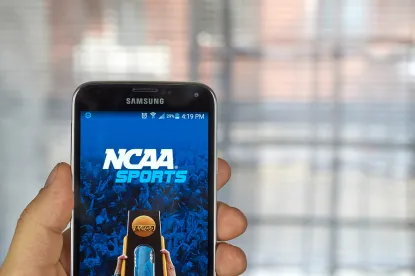Following the cancelation of the winter sports championships and the calendar of spring athletic events due to the COVID-19 pandemic, the NCAA is hoping to reset for the 2020-2021 academic year with a full slate of college football and other fall sports in September. While the NCAA and its members have been focused on student-athlete issues arising from the impact of pandemic, the NCAA has continued to address the issue of student-athlete name, image, and likeness issues—a topic at the forefront of conversation before the pandemic. In October, the NCAA Board of Governors approved a policy “permit[ting] students participating in athletics the opportunity to benefit from the use of their name, image and likeness in a manner consistent with the collegiate model.” During virtual meetings this week, the NCAA Board of Governors approved significant changes to the current NCAA Bylaws, allowing student-athletes’ ability to now profit from use of their name, image, and likeness.
Brief History of Name, Image, and Likeness Developments
In September, California passed SB 206, the first law to allow college student-athletes to market and profit from their name, image and likeness without affecting their student-athlete status with an effective date of July 1, 2023. Numerous other states followed by introducing similar bills, including New Jersey, New York, and Virginia. While Colorado is the most recent state to enact formal legislation with an effective date of January 1, 2023, Florida’s name, image and likeness rights for student-athletes will begin on July 1, 2021 following Governor DeSantis’ anticipated signature.
The National Football League Players Association (NFLPA) also became involved, partnering with the National College Players Association (NCPA) to support efforts to develop marketing and licensing for college athletes. Thereafter, the NCAA approved the policy permitting college athletes to benefit from use of their name, image, and likeness. The underlying goal of the NCAA’s policy was to limit the legislative issues generated by state-by-state rules regarding name, image and likeness rights. At the time, the NCAA indicated that further regulations and changes to its Bylaws would be forthcoming. To that end, the NCAA developed an internal Federal and State Legislation Working Group (FSLWG), tasked with gathering data and exploring solutions to name, image, and likeness issues.
On April 29, 2020, the FSLWG presented a long anticipated, comprehensive 31 page report to the NCAA Board of Governors proposing significant changes to the NCAA Bylaws regarding name, image, and likeness.
These changes—which range from general guidance to rules aimed at specific scenarios—allow student-athletes to use their name, image, and likeness to profit in a variety of way both related and unrelated to athletics. After approving the FSLWG’s recommendations, the NCAA Board of Governors directed all NCAA divisions to consider appropriate rules changes based on additional recommendations from the FSLWG. The divisions are expected to adopt new name, image and likeness rules by January to take effect at the start of the 2021-22 academic year.
Potential Changes to Student-Athlete Activities, Including Advertising and Promotion
The proposed recommendations revise the NCAA’s name, image, and likeness rules to permit a student-athlete to benefit in several areas with regard to personal business actions. For example,
- Fees for lessons as well as the right to use their name, image and likeness to run their camps and clinics.
- The use of their name, image and likeness to promote a personal athletic or non-athletic related business.
- Social Media content creation and distribution.
- Permit student-athletes to be paid for the sale of their autograph.
- Permit student-athletes to develop and model athletic and non-athletic clothing apparel.
- Allow a student-athlete to use and be compensated for use of their name, image or likeness to promote commercial products and services. The student-athlete would not be allowed to use their school’s institutional marks or apparel.
- Permit student-athletes to be compensated for personal appearances, including those at commercial locations and/or charitable, educational or nonprofit agencies. The student-athlete would not be permitted to use their school’s institutional marks or wear university apparel in such appearances.
However, these areas of potential expansion of student-athlete rights would contain overriding limitations which will restrict the ability of member institutions to be involved in these student-athletes business activities, prohibit the use of university marks, including uniforms, in any student business activity, and restrict the university from arranging the commercial opportunity or purchasing the student-athlete’s product or service.
Limitations Tied to Expanded Name, Image and Likeness Rights
Despite these expanded rights, the current recommendation still allows the NCAA and each university the right prohibit a student-athlete from engaging in name, image and likeness activities involving a commercial product or service that conflicts with NCAA legislation, for example sports wagering and banned substances. In addition, an institution would have the discretion to prohibit a student-athlete’s involvement in particular name, image and likeness activities, as defined by the institution (e.g., areas that conflict with institutional values or conflict with institutional arrangements).
The recommended NIL changes would also require a student-athlete to disclose information to the university’s athletics department related to the use of his or her name, image or likeness, including compensation arrangements and details of relationships with an involved individual, commercial entity and any third parties.
The proposal would also guarantee student-athlete representation to pursue these specific opportunities by amending the definition of an agent to permit a student-athlete to receive advice, assistance in contract negotiations and marketing of his or her athletics ability for purposes of name, image and likeness activities, provided the professional service provider does not market the student-athlete’s athletics reputation for professional sports opportunities.
The FSLWG is continuing to develop parameters for the name, image, and likeness rule changes and will likely issue further guidance as the NCAA holds Division I conferences and counsel meetings again in June. The NCAA still opposes compensating student-athletes outright for participation in college sports (“pay-for-play”). Thus, any additional recommendations will likely involve safeguards to avoid undermining this position.




 />i
/>i
